Middle East
Lebanon’s banks are spreading their wings as they push for more growth in the Middle East’s key markets.
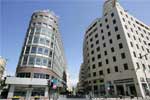 |
|
Banks in downtown Beirut: Lebanon’s financial institutions are expanding through the region. |
Lebanon’s economy has suffered significant setbacks since the assassination of former prime minister Rafic Hariri in February 2005 and the war with Israel in 2006, which has been followed by ongoing political instability and a decline in the tourism industry. Throughout all of this, the country’s banking sector has survived and even prospered.
“The volatility of the political and security situation and its effect on economic activity, be it consumption or investment, is probably among the highest in the world,” says Mazen Soueid, chief economist and head of research at BankMed in Beirut. He describes 2008 as a year of a whole range of possibilities. Economic growth could be anywhere from 1% to 8%, depending on whether there is a protracted stalemate on the election of a president or a wide-ranging political agreement, he says.
While last year’s rise in gross domestic product was little more than 2%, the country’s banks enjoyed a strong rise in profitability. BankMed earned $40.2 million in 2007, up from $3.2 million a year earlier. Nemeh Sabbagh, executive general manager of BankMed, attributes the improvement to a new culture of performance that has been instilled in the bank. Sabbagh joined BankMed in 2006 after serving for seven years as managing director of Arab National Bank, based in Riyadh, which is 40% owned by Amman, Jordan-based Arab Bank.
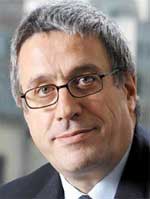 |
|
Baz: Syria needs banking services. |
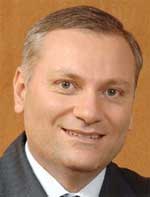 |
|
Azhari: Sees room for improvement. |
“Since September 2007 we have had a system that enables us to know the profit of BankMed on a daily basis, which enables us to achieve our targets,” Sabbagh says. “In addition, we have one of the cleanest portfolios of any bank in Lebanon.”
The Hariri family, the owners of the Oger Group, owns more than 99.9% of BankMed’s equity. Rafic Hariri, the late prime minister of Lebanon, formed the Saudi Oger Group, a major construction company, in 1978. The Oger Group is a financial and industrial conglomerate, whose investments include a controlling interest in Türk Telekom. The Hariri family is also one of the largest investors in Arab Bank, with a shareholding of more than 19%.
BankMed’s plan is to enter high-growth markets in the region that are of strategic importance, according to Sabbagh. In September 2006 BankMed acquired 41% of Turkey-based Turkland Bank in a strategic alliance with Arab Bank, which acquired a 50% stake. BankMed also acquired the management contract for Turkland Bank, which received a second capital increase of $85 million this year. Turkland, which focuses on lending to small and medium-size enterprises, now has 25 branches, up from 10 branches in 2006.
BankMed’s network includes Allied Bank, with which it merged in 2006, the Saudi Lebanese Bank and Méditerranée Investment Bank, which are all operating from a single banking platform. In addition, BankMed owns BankMed (Suisse), a private bank in Switzerland, and has a branch in Cyprus.
Sabbagh notes that BankMed applied one year ago to open an office in Algeria. It also has secured a license to operate an investment company in Saudi Arabia, under the name of SaudiMed Investment.
Banks Play Crucial Role
Lebanon’s banking sector, with assets equivalent to about 400% of gross domestic product, plays a key role in financing the government, as well as the private sector, and in supporting the country’s stable exchange-rate policy. The millions of Lebanese living overseas send more than $5 billion a year back to the country, adding to the deposit base. The top three Lebanese banks, Bank Audi, BLOM Bank and Byblos Bank, reported record combined profits of more than $500 million for 2007, an increase of 19% from a year earlier. BLOM Bank was the leader in terms of profits, with $205 million in 2007, followed closely by Bank Audi with $201 million. BLOM Bank also led in terms of return on average equity, at 15.7%, and return on average assets, at 1.3%.
“While these figures may appear impressive, especially taking into account the difficult economic environment, Lebanese banks still lag their regional peers,” points out Saad Azhari, chairman and general manager of BLOM Bank. “There is still room for improvement and growth, given that the equity and asset bases could have delivered even higher profits if [the rate of] profitability were in line with the region’s average,” he says.
Like other Lebanese banks, BLOM Bank is expanding rapidly throughout the Middle East region. It recently opened offices in Abu Dhabi, capital of the United Arab Emirates, and in Doha, Qatar. In the UAE, it already had established offices in Dubai and Sharjah. Meanwhile, BLOM Bank received a license in January to set up a brokerage and wealth management operation in Saudi Arabia. “We have found a location for our Riyadh office, and we expect to open in June or July,” Azhari says. The bank also has an application pending to open a branch in Algeria.
BLOM Bank is boosting its investment banking activities and strengthening its research team, Azhari says. In January the bank launched a securities fund that has grown to more than $90 million. The fund invests in a range of Lebanese equity and fixed-income securities.
In December 2005 BLOM Bank acquired Egypt-based Misr Romanian Bank (MRB), at a time when the Egyptian bank was not making a profit, Azhari says. BLOM Bank Egypt, as MRB was renamed, was profitable in its first year under new ownership, and its earnings rose 73.4% in 2007 to $20.1 million.
Many Lebanese do business in Syria and Jordan and travel between the three countries. BLOM Bank has five branches in Jordan, including two opened this year, as well as a branch at the Damascus Free Zone in Syria. An affiliate, Bank of Syria and Overseas (BSO), has 10 branches in Syria.
Byblos Bank, Lebanon’s third-largest bank, is rapidly expanding its international activities, as it follows its corporate clients into overseas markets, says Semaan F. Bassil, vice chairman and general manager. “After the 2006 war, a lot of Lebanese panicked and set up offices overseas, creating a brain drain,” he says.
Building Boom Begins
The local construction sector is booming in Lebanon, fed by reconstruction of areas destroyed in the war with Israel, Bassil says. “Lebanon is experiencing an inflow of aid and grants from Europe, the United States and countries in the Gulf,” he says. “These countries don’t want to see financial or economic chaos in Lebanon.”
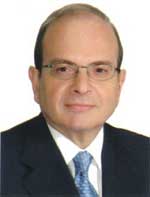 |
|
Sabbagh: We know profit on a daily basis. |
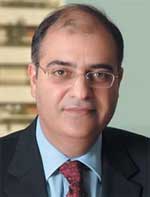 |
|
Bassil: 2006 war caused brain drain. |
Bank Audi, Lebanon’s largest bank, with $17.2 billion in assets at the end of last year, has expanded the pace of its regional expansion in recent years. It entered five new markets in 2006: Egypt, Sudan, Saudi Arabia, Qatar and the United Arab Emirates. “We did all that should be done to grasp the opportunities,” says Freddie Baz, group chief financial officer and adviser to the chairman.
After acquiring Cairo Far East Bank and changing its name to Bank Audi SAE, it rapidly expanded the Egyptian bank’s branch network. Bank Audi also acquired 75% of National Bank of Sudan, launched Audi Saudi Arabia to provide a full range of investment services and received a license to operate in the Qatar Financial Center. It also opened a representative office in Abu Dhabi.
Bank Audi already had received an authorization to operate 10 branches in Jordan at the end of 2003, where it now has eight branches, and it won permission to open a bank in Syria in 2005. This led to the creation of Bank Audi Syria, in which it holds a 47% stake, with the majority held by Syrian investors.
“Syria, a country with 17 million people, is a virgin market with big needs for banking services,” Baz says. “We operate in Syria as a universal bank and have been making profits since year one.” Bank Audi Syria already has 10 branches and will have 22 branches up and running by the end of 2008, according to Baz.
With Middle East banking assets soaring along with the price of oil, Bank Audi favors such areas as private banking and asset management. “We can contribute significantly to the development of the fixed-income market in Saudi Arabia,” Baz says. “Bank Audi handles $6 billion a year in turnover in Lebanese fixed-income securities,” he points out.
Meanwhile, Bank Audi plans to focus on niche markets in Algeria, Egypt and Saudi Arabia, which together account for 50% of the total Arab population and of the Arab world’s consolidated gross domestic product. “Our niche in Saudi Arabia will be middle- to small-size transactions and major cities outside Riyadh and Jeddah, which concentrate most of the business, that are totally neglected,” Baz says.
“Bank Audi’s strategy is to be an important regional player, with a presence in all of the major markets,” Baz says. The bank has an application pending for a branch in Algeria and will be taking a look at the two or three privatizations that are likely in Tunisia this year, according to Baz. Bank Audi also is finalizing an application for a banking license in Yemen.
Low economic and business activity in Lebanon stem from the fact that investment and consumer confidence have both taken a nosedive, says economist Soueid of BankMed. On the other hand, the banking sector, as always, continues to play its role as anchor of stability in volatile economic conditions, he says. But the protracted political crisis of the past three years has deprived Lebanon of the surge in growth rates that the Middle East region has been witnessing.
This is the second time that Lebanon is missing out on an oil-driven boom in the region, Soueid says. During the boom of the late 1970s, the country was torn by the raging civil war and hence did not benefit from the abundant liquidity seeking investment opportunities.
Gordon Platt



